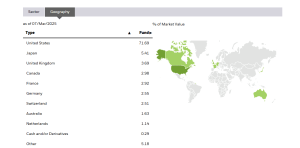Investors who own index funds and actively managed mutual funds long ago surrendered the voting of their shares to giant asset managers. But the titans appear ready to return this voting power to individual shareholders — which is where it belongs.
If you own shares in a public company, you get to vote on key issues, such as who its directors are or a proposed merger with another company. That’s because for centuries the law has sensibly said that the suppliers of equity capital should choose their stewards and weigh major corporate changes.
But if you hold shares through an index fund, mutual fund or retirement account, the fund managers usually decide how to vote your interests. That’s due to practical difficulties that arise when the capital of millions of small investors is pooled into a massive fund.
For the past few decades, having individuals cede their voting power to big funds was appealing. During that time, most shareholder votes were about business basics including director elections, corporate strategy and mergers. Asset managers such as BlackRock and Vanguard voted based on what seemed best for clients financially.
But two forces have changed this in recent years. First, the corporate ballot has become a battleground for politics and social policy. The most debated topics at shareholder meetings now are not business strategy or director savvy but environmental justice and civil rights.
Second, while asset managers remain duty-bound to vote as investment fiduciaries, the social and political activists have reshaped their thinking. Activists, managers and political appointees now often say it’s in every shareholder’s financial interest at every company to prioritize their favored political and social goals — such as net-zero emissions or civil rights audits.
Such proposals perhaps do add desired shareholder value. But not every proposal creates shareholder value (examples run from voluntary emissions reductions to mandatory identity quotas). Many are feel-good but costly placebos and almost all pose trade-offs about which reasonable investors disagree.
Some asset managers are awakening to this new reality. BlackRock, which manages $10 trillion, said it is working to enable its millions of individual clients to cast their own votes on corporate ballots, rather than imposing its will on them.
That’s the right thing to do, and it’s also in BlackRock’s business interest. After all, if shareholder votes continue to resolve political rather than business issues, people will no longer defer to asset managers but insist that their own voice be heard. If asset managers continue to impose their views on clients, those clients will move their money to rivals.
Read: More proxy battles are ending with deals, not votes
The pressure on asset managers to devolve the vote to individuals is also good for corporate directors and managers. They can get back to business, focusing on those who supply capital and their preferences, rather than pandering to special-interest groups whose agendas and incentives may not align with those of shareholders.
It was once thought that individual shareholders could not hold managers accountable because their small stakes meant they lacked incentives to monitor or the power to coordinate. By pooling into large funds, institutional asset managers would overcome both problems, as they tended to do for several decades.
Nowadays, individual shareholders may find such institutional power to be not only undesirable but unnecessary. Unlike the 1980s or before, individuals have many robust ways to coordinate, from Reddit to social media. The phenomena of meme stocks has shown the power and value that even small stakes command.
As active individual investors rediscover their voice, they threaten the business model of big asset managers. BlackRock and other giants are right to see that they must change their business practices in order to preserve their presence.
Lawrence A. Cunningham is a professor at George Washington University, founder of the Quality Shareholders Group, and publisher, since 1997, of “The Essays of Warren Buffett: Lessons for Corporate America.” For updates on Cunningham’s research about quality shareholders, sign up here.
Also: Women and minority directors on company boards add value, but not for the reasons you think
This post was originally published on Market Watch





